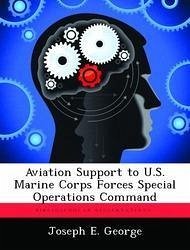United States Marine Corps Forces Special Operations Command (MARSOC) was activated on 24 February 2006. Unlike most United States Marine Corps (USMC) warfighting commands, MARSOC is not organized for combat as a Marine Air-Ground Task Force (MAGTF) and as such has no inherent aviation capabilities. This paper will describe the origins of Special Operations Command (SOCOM), the historical lack of a USMC contribution to SOCOM, the creation of MARSOC as the first USMC unit in SOCOM, and most importantly, aviation support to MARSOC. The major question is how MARSOC will coordinate aviation support to meet training and operational requirements. Without direct ties to a Marine Aircraft Wing (MAW) and without a co-located element of Air Force Special Operations Command (AFSOC), or a United States Army Special Operations Command (USASOC) aviation element, the means for coordination of aviation support for MARSOC operations is not readily apparent. This paper will examine how MARSOC's aviation support requirements are being met, how their operational support requirements might be met in the future, and the impact on traditional USMC forces. Additionally, several courses of action will be presented along with a recommendation for the way forward with respect to aviation support to MARSOC.








